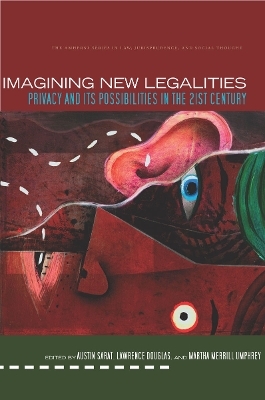
Imagining New Legalities
Privacy and Its Possibilities in the 21st Century
Seiten
2012
Stanford University Press (Verlag)
978-0-8047-7704-9 (ISBN)
Stanford University Press (Verlag)
978-0-8047-7704-9 (ISBN)
This book reminds us that examining the right to privacy and the public/private distinction is an important way of mapping the forms and limits of power that can legitimately be exercised by collective bodies over individuals and by governments over their citizens.
Imagining New Legalities reminds us that examining the right to privacy and the public/private distinction is an important way of mapping the forms and limits of power that can legitimately be exercised by collective bodies over individuals and by governments over their citizens. This book does not seek to provide a comprehensive overview of threats to privacy and rejoinders to them. Instead it considers several different conceptions of privacy and provides examples of legal inventiveness in confronting some contemporary challenges to the public/private distinction.
It provides a context for that consideration by surveying the meanings of privacy in three domains—-the first, involving intimacy and intimate relations; the second, implicating criminal procedure, in particular, the 4th amendment; and the third, addressing control of information in the digital age. The first two provide examples of what are taken to be classic breaches of the public/private distinction, namely instances when government intrudes in an area claimed to be private. The third has to do with voluntary circulation of information and the question of who gets to control what happens to and with that information.
Imagining New Legalities reminds us that examining the right to privacy and the public/private distinction is an important way of mapping the forms and limits of power that can legitimately be exercised by collective bodies over individuals and by governments over their citizens. This book does not seek to provide a comprehensive overview of threats to privacy and rejoinders to them. Instead it considers several different conceptions of privacy and provides examples of legal inventiveness in confronting some contemporary challenges to the public/private distinction.
It provides a context for that consideration by surveying the meanings of privacy in three domains—-the first, involving intimacy and intimate relations; the second, implicating criminal procedure, in particular, the 4th amendment; and the third, addressing control of information in the digital age. The first two provide examples of what are taken to be classic breaches of the public/private distinction, namely instances when government intrudes in an area claimed to be private. The third has to do with voluntary circulation of information and the question of who gets to control what happens to and with that information.
Austin Sarat is the William Nelson Cromwell Professor of Jurisprudence and Political Science at Amherst College. Lawrence Douglas is James J. Grosfeld Professor of Law, Jurisprudence, and Social Thought at Amherst College. Martha Merrill Umphrey is Professor of Law, Jurisprudence, and Social Thought at Amherst College.
| Erscheint lt. Verlag | 14.3.2012 |
|---|---|
| Reihe/Serie | The Amherst Series in Law, Jurisprudence, and Social Thought |
| Verlagsort | Palo Alto |
| Sprache | englisch |
| Maße | 152 x 229 mm |
| Gewicht | 408 g |
| Themenwelt | Recht / Steuern ► Allgemeines / Lexika |
| Recht / Steuern ► EU / Internationales Recht | |
| ISBN-10 | 0-8047-7704-7 / 0804777047 |
| ISBN-13 | 978-0-8047-7704-9 / 9780804777049 |
| Zustand | Neuware |
| Haben Sie eine Frage zum Produkt? |
Mehr entdecken
aus dem Bereich
aus dem Bereich
Buch | Softcover (2023)
Franz Vahlen (Verlag)
CHF 27,70
Sammlung des Zivil-, Straf- und Verfahrensrechts, Rechtsstand: 14. …
Buch | Hardcover (2024)
C.H.Beck (Verlag)
CHF 53,20


